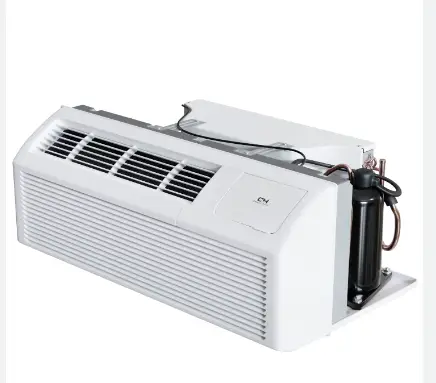Is Ptac Gas Or Electric
When it comes to PTAC units, one of the most common questions that arises is whether they are gas or electric. In order to understand this distinction, it’s important to have a solid understanding of what exactly a PTAC unit is and how it operates. PTAC stands for “Packaged Terminal Air Conditioner,”and it is a type of heating and cooling system commonly found in hotel rooms, apartments, and other multi-room buildings. Is PTAC gas or electric?

Now, let’s get down to the nitty-gritty: Is PTAC gas or electric? The answer is actually both. While PTAC units primarily operate using electricity, some models also have the capability to utilize natural gas as a fuel source for heating purposes. This dual-fuel functionality provides flexibility and efficiency in different climates and energy availability scenarios. However, the majority of PTAC units on the market today are solely electric-powered due to their ease of installation and maintenance. So whether you’re concerned about environmental impact or simply looking for an efficient solution for your space, understanding the fuel options available in PTAC units is crucial.
Is PTAC gas or electric
PTAC is an electric system, making it a convenient and energy-efficient choice for heating and cooling your space. As experienced PTAC installers, we understand the importance of selecting the right system for your needs. PTAC heating and cooling units are specifically designed to operate on electricity, providing reliable performance while minimizing energy consumption. This not only saves you money on utility bills but also reduces your carbon footprint.
When it comes to maintenance services, finding a trustworthy PTAC repair near me is essential. Regular maintenance ensures that your PTAC system operates at its optimal efficiency, prolonging its lifespan and preventing costly repairs down the line. Our team of skilled technicians specializes in PTAC air conditioner repair near me, offering comprehensive services to keep your unit running smoothly.
Now that we have established that PTAC is an electric system, let’s explore whether it is better than gas-powered alternatives in the next section. The PTAC installer, with their expertise and precision, ensures that these versatile heating and cooling units are seamlessly integrated into your space, delivering optimal performance and comfort.
Is ptac gas or electric which is better
Imagine having a heating and cooling system that not only keeps you comfortable, but also operates seamlessly without the need for any fuel or flames. That’s exactly what a PTAC (Packaged Terminal Air Conditioner) unit offers. PTAC units are electrically powered, making them an efficient and reliable choice for both residential and commercial spaces. Here are some reasons why PTAC units, which can be easily installed by professional ptac installation services in New Jersey, are a better option over gas-powered systems:
- Energy Efficiency: PTAC units are designed to provide precise control over temperature settings, resulting in optimal energy usage. This means that they consume less electricity compared to gas-powered systems, leading to lower utility bills.
- Safety: With no open flames or combustible fuels involved, PTAC units eliminate the risk of carbon monoxide leaks or fire hazards associated with gas-powered systems. This makes them a safer option for both occupants and property owners.
- Easy Maintenance: Unlike gas-powered systems that require regular inspections and maintenance to ensure safe operation, PTAC units are relatively low-maintenance. Routine cleaning of filters and periodic check-ups by ptac repair experts in New Jersey is usually all that is needed to keep them running smoothly.
- Versatility: PTAC units offer both heating and cooling capabilities in a single unit, making them versatile options for year-round comfort. They can be easily controlled with thermostats or remote controls, allowing users to adjust settings according to their preference.
Incorporating these advantages into your decision-making process when choosing a heating and cooling system will help you make an informed choice about the best option for your space. Now let’s delve into common problems with PTAC units without skipping a beat.
Common problems with PTAC unit
Efficiency and safety concerns are not the only factors to consider when it comes to a heating and cooling system; there are common problems that can arise with a PTAC unit as well. Despite being reliable and durable, PTAC units can experience issues over time. One common problem is the accumulation of dirt and debris in the air filters, which can restrict airflow and reduce the unit’s efficiency. Regular cleaning or replacement of these filters is essential to ensure proper functioning of the PTAC unit.
Another common problem is a malfunctioning thermostat, which can result in inaccurate temperature readings or difficulty in adjusting the desired temperature. This can lead to discomfort for users and inefficient energy usage. Additionally, leaks in the refrigerant lines or drain tubes may occur, causing water damage or reduced cooling performance. It is important to regularly inspect these components and address any leaks promptly.
To help you understand better, here is a table summarizing some common problems with PTAC units:
| Common Problem | Description | Solution | | ————- |:————-:| —–:| | Dirty Air Filters | Accumulation of dirt and debris in the air filters restricts airflow | Clean or replace filters regularly | | Malfunctioning Thermostat | Inaccurate temperature readings or difficulty adjusting desired temperature | Repair or replace thermostat | | Leaks in Refrigerant Lines/Drain Tubes | Water damage or reduced cooling performance due to leaks | Inspect for leaks and repair if necessary |
Addressing these common problems promptly will help maintain optimal performance of your PTAC unit. Now let’s transition into discussing what “PTAC”stands for in HVAC without any further delay.
What does PTAC stand for in HVAC
Having a PTAC unit in your home can provide you with the ultimate comfort and convenience, allowing you to easily control the temperature without any hassle. But what does PTAC stand for in HVAC? Well, PTAC stands for Packaged Terminal Air Conditioner. This type of unit is commonly found in hotels, motels, apartments, and other commercial buildings. It is designed to provide both heating and cooling capabilities in a single device.
A PTAC unit works by drawing in fresh air from outside and passing it through a filter before conditioning it either for cooling or heating purposes. The conditioned air is then distributed into the room through a fan or blower. These units are typically installed through an exterior wall and have their own individual thermostat for temperature control. They also come with features like adjustable louvers to direct airflow and timers for energy-saving operation. Many people wants to know Is PTAC Central.
Having a PTAC unit in your home can be incredibly beneficial as it offers both heating and cooling capabilities in one device. With its ability to efficiently regulate the temperature, you can enjoy maximum comfort while maintaining control over your environment without any hassle. So if you’re looking for an HVAC system that provides convenience and freedom, consider installing a PTAC unit in your home or office space. PTAC heating and cooling units are an ideal choice for versatile and efficient climate control in various settings, from hotel rooms to office spaces. For any HVAC or PTAC service do contact Bluco Mechanical or call us at (929) 447-2077.
Frequently Asked Questions
How much does a PTAC unit cost?
PTAC units, like a trusted compass guiding us through the maze of comfort, come in both gas and electric options. Now let’s delve into the cost of these efficient climate controllers that bring freedom to our spaces.
Are PTAC units energy-efficient?
Yes, PTAC units can be energy-efficient. They are designed to provide heating and cooling with minimal power consumption. By using advanced technology and efficient components, PTAC units help save energy and reduce utility costs, giving you the freedom to enjoy comfort without worrying about excessive energy usage.
Can a PTAC unit be used for both heating and cooling?
Yes, a PTAC unit can be used for both heating and cooling. It is a versatile system that uses an electric heat pump or gas furnace to provide efficient temperature control throughout the year.
What size PTAC unit do I need for my space?
To determine the size of PTAC unit needed for your space, consider factors such as square footage, insulation, and climate. Consulting with a professional can help ensure you choose the right unit for optimal heating and cooling efficiency.
Can a PTAC unit be installed in any type of building or space?
Yes, a PTAC unit can be installed in any type of building or space. It’s like a versatile tool that fits perfectly into the puzzle of HVAC systems, providing comfort and freedom from worrying about temperature control.



No Comments
Be the first to start a conversation